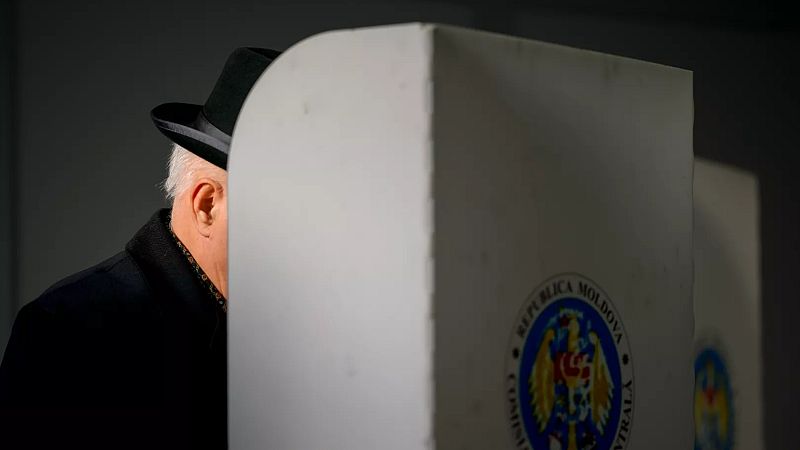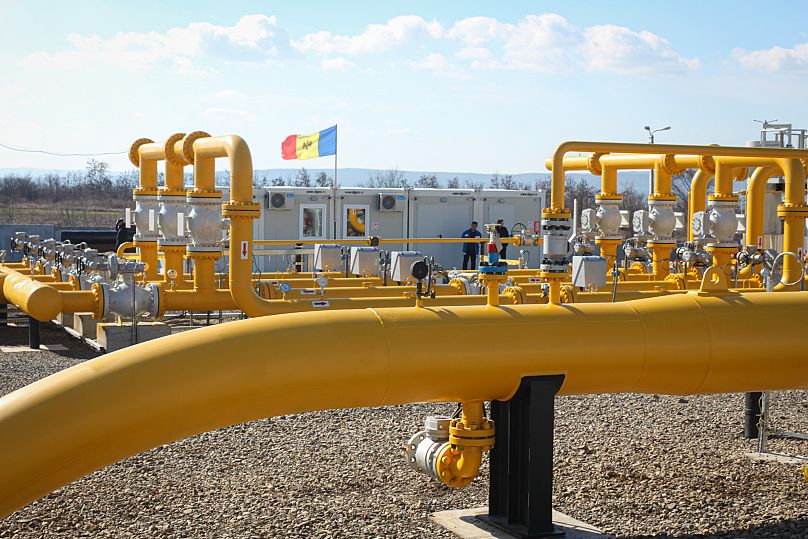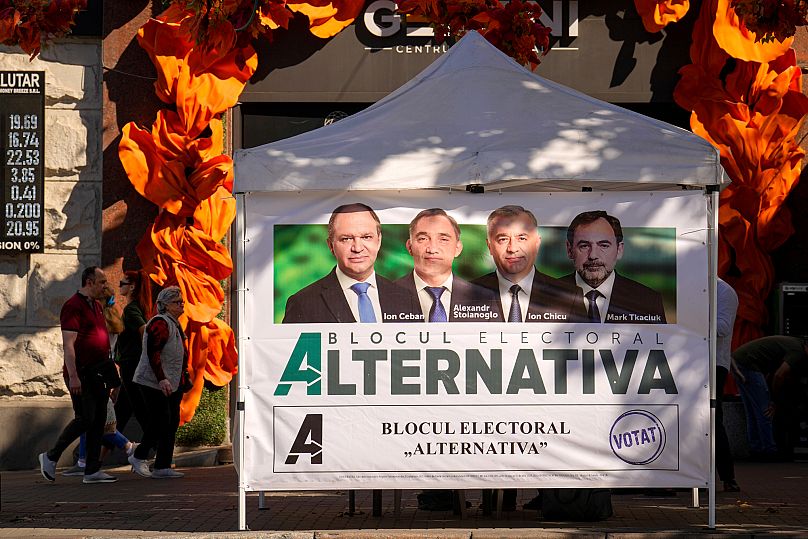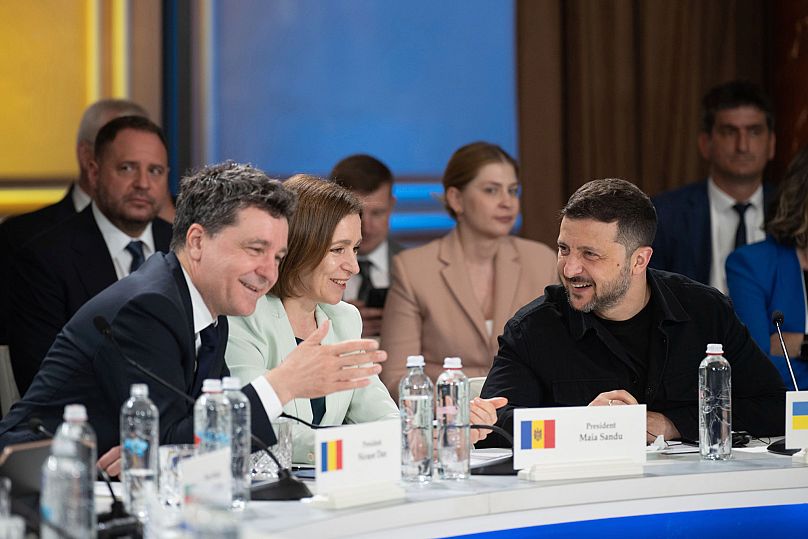Russia’s disinformation toolbox in Moldova: Bot networks, Moscow church propaganda and vote-buying

Bot networks, fake government orders and even Moscow-subordinated church priests: Russia has been ramping up its hybrid assault on Moldova in the run-up to the parliamentary elections on Sunday.
Eugen Muravschi, associate expert at Moldovan think tank WatchDog.md told Euronews that Russia has been using a varied array of tools in its hybrid war, “pouring so much money into this it is difficult to keep track of the numbers” with vote-buying being the most serious threat.
“More money for vote buying, more money for disinformation, more bots and so-called online activists. Crypto-currencies have become a more prominent tool compared to the last elections," Muravschi explained.
He said that strictly in terms of disinformation one of the main tools is the bot networks used to amplify fake news, criticism against the government and anti-EU narratives.
“Using local influencers on Facebook or TikTok to target audiences that don’t follow politics closely is another growing trend.”
According to Muravschi, another effective tool is sending “fake government orders”.
“There was (a fake government order) for public institutions to display rainbow flags and another one for schools to display LGBT informational posters at the beginning of the school year,” he pointed out.
According to Muravschi, Russia likes to exploit the LGBTQ+ topic, claiming that EU integration means the abandonment of traditional values and “LGBT propaganda” in schools and kindergartens. “Moldova is a conservative country and this is a topic that generates heated debates, where emotions are more important than arguments”.
Energy is another strong talking point for Russia, Muravschi said.
“The illusory promise of cheap gas and electricity is very attractive for families with low income, who need to think about this month’s bills and not about the long-term development of the country,” he pointed out to Euronews.
Muravschi added that Moscow is also using the Moscow-subordinated Orthodox Church “to spread Russian propaganda”.
Euronews reported earlier that the Central Election Commission has already recorded instances in which priests were involved in political propaganda activities.
The electoral authority in Chișinău has warned that the involvement of the church in the election campaign is contrary to the law and has called on representatives of religious denominations to refrain from engaging in political activities.
According to WatchDog.md, Moscow is also using “fake foreign outlets or real pay-to-publish websites that post Russian propaganda texts, then these texts are shared in Moldova with added credibility of being from Western sources."
'More money for vote buying, for disinformation, more bots'
Most of these tools are not new and were already used by Moscow last year in its disinformation campaign amid Moldova’s presidential elections and the 2024 referendum.
But this year’s campaign is “more intense and aggressive,” Muravschi said.
“In terms of technical changes, Russia has been building a network of so-called 'infoleaders': real people from Moldova, trained and paid to administer multiple accounts and to disseminate Russian disinformation.”
Muravschi said one of Russia’s key strategies this time around revolved around “the promotion of a political Trojan horse”.
“A self-proclaimed ‘pro-European’ bloc called ‘Alternativa’ is made up of politicians with well-documented ties to Russia. It is a ruse to get pro-European voters to vote for pro-Russian politicians,” he explained.
WatchDog.md pointed out that this is “an indirect acknowledgement by Russia that most Moldovans are pro-EU and that pro-Russian messaging alone cannot win them the elections”.
But the authorities have also strengthened their stance on disinformation.
On Monday Chișinău officials said they had carried out 250 raids and detained dozens of people as part of an investigation into an alleged Russia-backed plan to incite "mass riots" and destabilise the country in the run-up to critical parliamentary elections.
The raids targeted more than 100 people and took place in multiple localities across the country, police said.
Seventy-four people were detained for up to 72 hours, said Victor Furtuna, Moldova's chief prosecutor from the Office for Combating Organised Crime and Special Cases.
Moldova's police said that the unrest plot was "coordinated from the Russian Federation, through criminal elements."
What is Moscow’s endgame in Moldova?
Muravschi told Euronews that what Moscow wants is “a loyal, obedient government in Chișinău”.
“Putin’s regime does not see Moldova, or any other ex-Soviet republic for that matter, as an independent country. A pro-Russian regime in Moldova would be for Moscow a legitimate restoration of its sphere of influence.”
He explained that in practical terms, Moldova can be used by Moscow in many ways: to help circumvent Western sanctions, to undermine diplomatic support for Ukraine, to amplify Russian influence in Romania, to organise Russian sabotage missions in Europe and, “perhaps worst of all, to send more Russian soldiers to Transnistria and then use the region to attack Ukraine militarily”.
“War is used by Russia very cynically. For some voters, Russian propaganda paints the “collective West” as being responsible for the war in Ukraine.”
With this narrative, Moscow claims that the EU accession would drag Moldova into the war and that the country would be used “as a platform of attack against Russia”.
“For voters who do not necessarily share Russia’s point of view on the war in Ukraine, the messaging is different: Moldova must not 'provoke' Russia by getting closer to the EU, otherwise we will get the same treatment as Ukraine," Muravschi said.
"This is half-explicit, half-implied, of course, as Russian propaganda cannot directly acknowledge Moscow’s role as an aggressor.”
In an opposite “incentivising” approach, Russia’s campaign is often focused on energy and “the illusory promise of cheap gas and electricity”, which is very attractive for families with lower incomes.
Moldovan President Maia Sandu has described EU accession as a "matter of survival" for the central European state and said the Eastern European country is in a "race against time" to protect the country from Russia, which she described as “the greatest threat we face”.
Warning of Russian interference and influence beyond Moldova’s border, she claimed that Moscow’s ultimate goal is to further expand into Europe.
“Europe is the target” for Russian interference and hybrid warfare, Sandu emphasised. “The Kremlin’s goal is clear: turn us into a launchpad for hybrid attacks on the European Union".
Today




